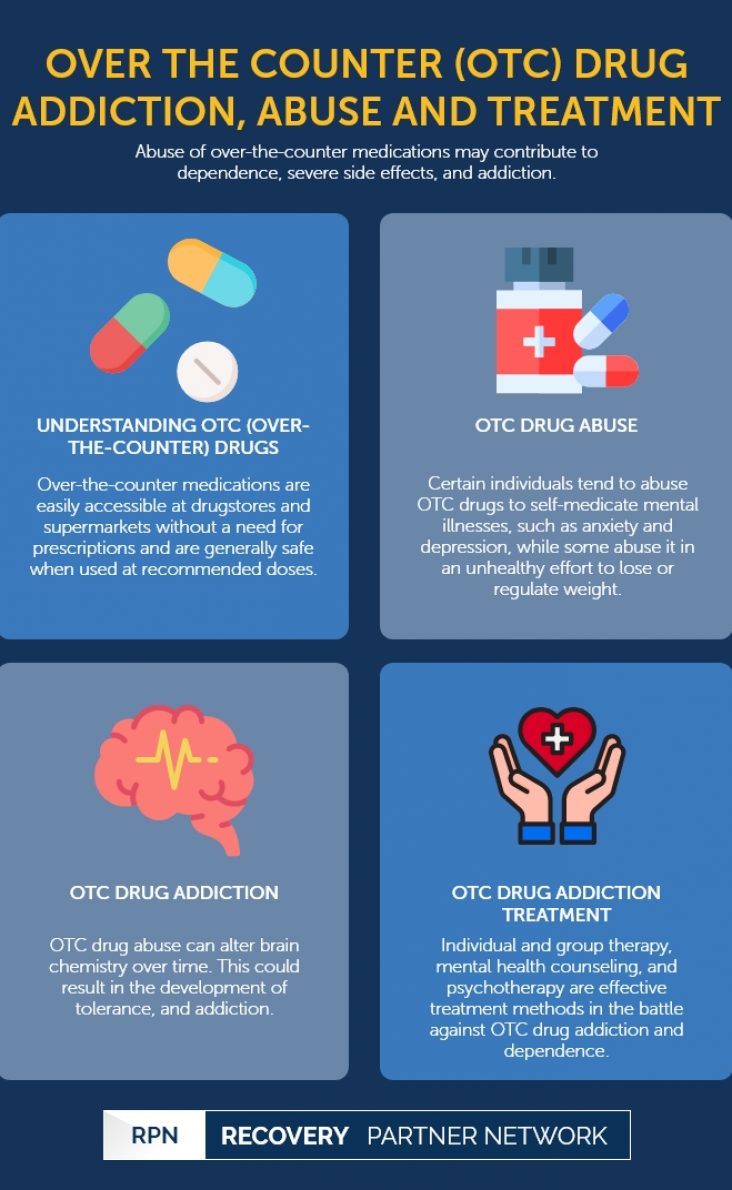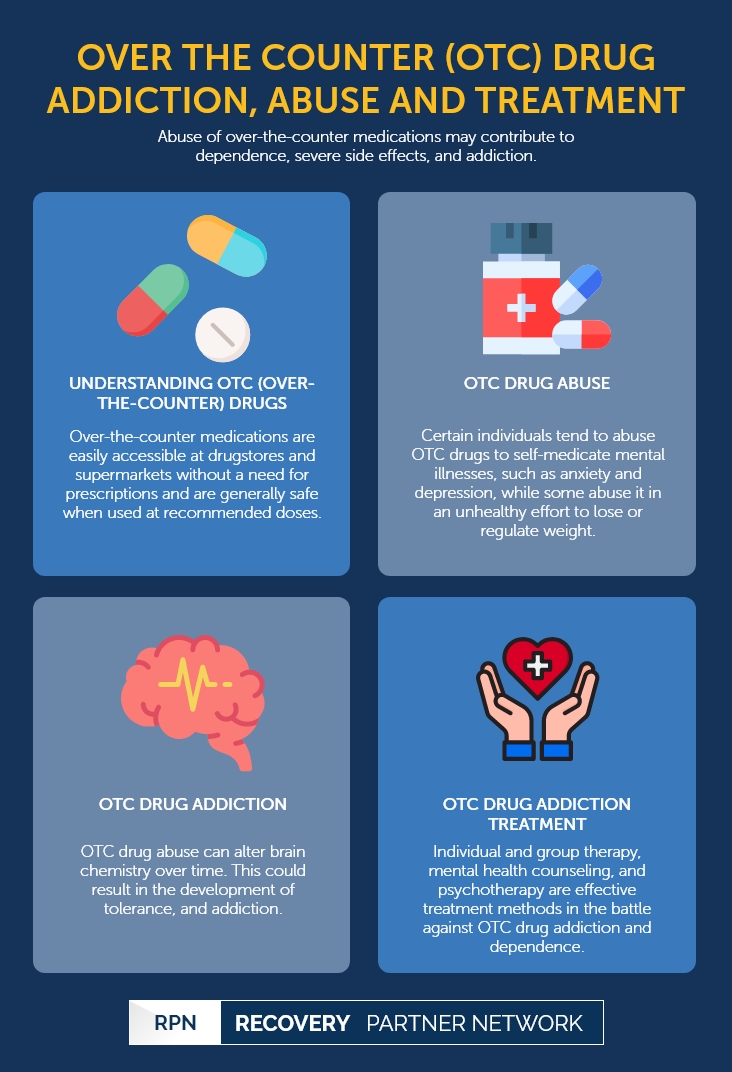Abuse of over-the-counter medications may contribute to dependence, severe side effects, and addiction.
Over the Counter (OTC) Drug Addiction, Abuse and Treatment
Opioid
- Hydrocodone/paracetamol addiction
- Buprenorphine/Naloxone addiction
- Central nervous system depressant
- Codeine addiction
- Dextropropoxyphene addiction
- Fentanyl abuse
- Hydromorphone addiction
- How Long do Opioids Stay in Your System?
- Hydrocodone addiction
- Kava addiction and abuse
- Loperamide addiction
- Lortab addiction
- Medical prescription opioid
- Methadone addiction
- Morphine addiction
- Norco addiction
- NyQuil addiction
- Opioid use disorder
- OTC substance abuse
- Oxycodone addiction
- Oxycodone/paracetamol addiction
- Opioid epidemic
- Lean addiction
- Pethidine addiction
- Snorting Oxycodone
- Synthetic Opioids
- Tramadol addiction
OTC substance abuse | Table of Contents
Understanding OTC (Over-the-Counter) Drugs
Over-the-counter medications are easily accessible at drugstores and supermarkets without a need for prescriptions. OTC medications are generally safe when used at recommended doses. Although OTC drugs and generally low in potency, they still hold the capacity to form dependence, tolerance, and addiction among its user, similar to illicit drugs and prescription medications.
The review of OTC drugs is primarily carried out by the US Food and Drug Administration’s (FDA) Division of Drug Information (DDI), the Center for Drug Evaluation and Research (CDER), and the Nonprescription Drug Advisory Committee (NDAC). These subdivisions analyze and examine all OTC products and labels and produce a drug monograph for each product. The monograph includes information such as ingredients, quantities, formulas, effects, side-effects, dosage, indications, and appearance. All new products that comply with the current OTC drug monograph will be permitted to enter the market without further scrutiny by the FDA. However, the OTC products that do not comply with the OTC monograph must be approved by the development and approval process of the FDA.
Some of the commonly abused OTC medications are:
- Cough medications (Dextromethorphan, or DXM)
- Cold medicines (Pseudoephedrine)
- Motion sickness pills (Dimenhydrinate)
FAQ
OTC stands for over-the-counter drugs. They are medications you can purchase without a prescription from a doctor.
Popular examples of OTC drugs include pain relievers such as acetaminophen (Tylenol) and ibuprofen (Motrin, Advil), cough suppressants like dextromethorphan (Robitussin) and antihistamines such as loratadine (Claritin 24H).
Certain OTC medicines alleviate aches, pains, and itchiness, while some prevent or cure diseases, such as tooth decay or an athlete’s foot. Others help manage recurrent problems, such as migraines and allergies.
OTC Drug Abuse
OTC medications have tremendous medical applications and effects, from treating moderate discomfort to motion sickness. Certain individuals tend to abuse OTC drugs to self-medicate mental illnesses, such as anxiety and depression, while some abuse it in an unhealthy effort to lose or regulate weight. The off-label use of any OTC medications or in doses and methods that are not recommended are considered abuse. OTC medications are generally abused due to their capability to generate euphoric highs and hallucinations when consumed in large doses. Individuals who abuse OTC drugs are highly likely to experiment with illegal and more potent drugs.
The risks of consuming OTC drugs may include:
- OTC drugs may interact with other medications, supplements, foods, or drinks.
- Some medications may cause complications due to pre-existing health conditions in the user. For example, individuals with high blood pressure should not take decongestants.
- Some individuals may experience an allergic reaction to certain medications.
- Most medications are unsafe during pregnancy and breastfeeding.
- Be cautious of OTC medication for children as they must only be given at a precise dosage and during a certain time frame.
Consumers are advised to read the information provided on the label on all OTC products and contact their physician, pharmacist, or other health care professionals if they have any queries regarding the use of OTC medications. Pregnant women should communicate with their doctor before taking any drug, vitamin, or herbal supplement, even if it is an OTC product. Abuse of OTC drugs can result in health issues, including memory loss, kidney failure, heart disease, and even death.
Cough Medicines (Dextromethorphan, or DXM)
Cough medicines can generate hallucinations and a powerful high when abused. These medications are widely abused among young individuals, as they are often within reach. The Drug Enforcement Administration (DEA) reports various dose-dependent plateaus faced by individuals who abuse DXM. Accordingly, the highest prescribed daily dose of DXM is 120 mg, and anything beyond that can give rise to intoxication and harmful side effects.
- Doses of 100 to 200mg: induce mild stimulation and euphoria.
- Doses of 200 to 400mg: result in more potent euphoria and hallucinations.
- Doses of 300 to 600mg: lead to loss of motor co-ordination and visual distortions. The combination of euphoria and hallucination during this stage may increase the risk of accidents.
- Doses of 500 to 1500mg: generate abnormal body sensations. At this stage, patients are highly sedated and may experience severe hallucinations and dissociative symptoms similar to PCP addiction.
Other side effects that arise from DXM abuse are liver damage and the development of a substance use disorder or drug addiction. DXM does not produce severe withdrawal symptoms in individuals who abuse the medication. However, individuals who have abused it for a prolonged period may experience various emotional and psychological complications during the abrupt cessation of the drug.
High doses of DXM can cause:
- Muscle twitching
- Extreme drowsiness
- Heart palpitations
- Brain damage
- Breathing problems such as irregular or slow breathing
- Blacking out
- Blood pressure changes, either too high or too low
- Rapid heart rate
- Blurred vision
- Elevated body temperature
- Vomiting
Cold Medicines (Pseudoephedrine)
Pseudoephedrine is a stimulant and an active ingredient in a variety of cold medicines. It is used to alleviate nasal and sinus congestion from colds or allergies. In rare cases, pseudoephedrine abuse can generate hallucinations or an extreme “body high.” Pseudoephedrine is also used in the manufacture of illicit drugs, such as methamphetamine.
Pseudoephedrine abuse can cause:
- Irregular heartbeat
- Shortness of breath
- High blood pressure
- Dizziness
- Seizures
- Brain damage
Motion Sickness Pills (Dimenhydrinate)
Dimenhydrinate is used widely to ease motion sickness and vertigo. High doses of this medication can cause:
- Hallucinations
- Ringing in the ears
- Nausea
- Irregular heartbeat
- Seizures
- Coma
- Death
These drugs are also abused for their psychedelic effects and are considered as a form of deliriant when administered at high doses (between 200-1200mg depending on body weight).
OTC Drug Addiction
Recreational OTC drug abuse can alter the chemistry of the brain over time. Eventually, the patient develops a drug tolerance, which would require them to consume higher doses of the drug to achieve the desired effects. Many addicts of OTC drugs can also encounter withdrawal symptoms when they refrain from indulging in their use.
Common OTC withdrawal symptoms include:
- Confusion
- Irritability
- Agitation
- Anxiety
- Mood swings
Learning to recognize an OTC drug addiction can be difficult, especially since OTC drugs, such as Tylenol and various cough medicines, do not project the same dangerous image as illicit drugs like heroin, and many do not perceive them as addictive.
FAQ
- How does a drug become OTC?
- What OTC's are best for inflammation?
- Is paracetamol an OTC drug?
- Are vitamins OTC drugs?
- Can you sell OTC drugs?
- Are OTC drugs safe?
In order to obtain the FDA’s approval to change the classification of a prescription drug to OTC, the manufacturer of the product must demonstrate its safety and efficacy. Generally, drugs can become OTC if they can be used safely and effectively without instructions from a health care provider.
Nonsteroidal anti-inflammatory drugs (NSAIDs), such as high-dose aspirin, Ibuprofen (Advil, Motrin, Midol) and Naproxen (Aleve, Naprosyn) are the best OTC drugs for reducing inflammation.
Yes, acetaminophen (paracetamol) is an OTC painkiller available from pharmacies to treat acute pain.
A key distinction between vitamins, supplements, and herbals is that they do not undergo the same testing as OTCs. Although they come in similar packages and may be molded just like pills, they are not regarded as OTC medicines.
Yes. Any product that complies with the OTC monograph can be produced and sold without the need for an individual product license.
OTC drugs are generally safe when used at the recommended doses. However, similar to other illegal and prescription drugs, they can also be abused. Although less potent than other substances, OTC drugs still run a risk of addiction and abuse.
OTC Drug Abuse Statistics
- In 2005, the FDA released a warning report about dextromethorphan misuse following many drug-related incidents.
- About 3.1 million young individuals aged 12 to 25 have indulged in non-prescription cough and cold medicine to get high.
- Around 4 percent of 12th graders have consumed some form of cough medication.
- Estimates indicate that about 10 percent of teenagers have abused cough syrups.
OTC Drug Addiction Treatment
Various treatment options are widely available for individuals grappling with OTC drug addiction. Individual and group therapy, mental health counseling, and psychotherapy, such as Cognitive Behavioral Therapy (CBT), are effective treatment methods in the battle against OTC drug addiction and dependence.
Depending on individual requirements, Inpatient, outpatient, or residential treatment services offer support for those suffering from OTC drug abuse to achieve and maintain sobriety. Enrolling in a drug recovery program will dramatically reduce the risk of a relapse. Patients are also advised to continue with treatment after the completion of rehab through an aftercare program to maintain and prolong their recovery.
Overcoming an OTC addiction can be tough, but it’s far from impossible. Inpatient drug treatment services offer 24-hour medical care, while outpatient rehabs offer the flexibility to attend the designated rehabilitation facilities while maintaining obligations and responsibilities at home or work. Attending a 12-step group, such as Narcotics Anonymous, can provide support and a sense of community to aid with long-term recovery.
Recovery Partner Network
We aim to educate and empower. If you feel our library of resources does not cover your specific need, reach out to us, and we would be happy to help.
STATISTICS
© Copyright 2026


